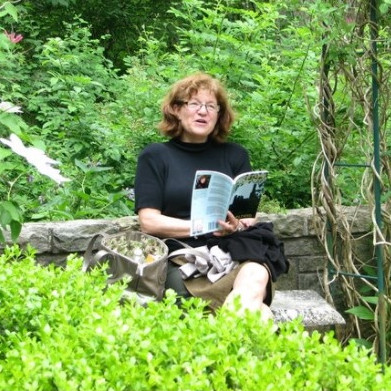Joan Gelfand describes her writing practice as a stove with all four burners firing at once. Looking at her journey thus far and the events still to come, one must agree. I picture her as a chef in a small but powerful kitchen. Burners lit, prep station lined with ingredients, dishes going in and out of pots and pans like clockwork, all in service of a three-course dinner that seems to have been effortlessly created. Any chef will agree—effortlessness requires a good knife and good heat. Joan’s words are the knife and the heat is her four burners kept boiling: craft, commitment, community, and confidence.
Her book, You Can Be A Winning Writer: The Four C’s Approach of Successful Authors, is a holistic approach to creating a writing life that incorporates all the necessary elements to writing success—honing your craft, prioritizing your practice, finding your community, and finally, developing and building the confidence to share your work with the world. In her opening letter, Joan mentions that she wrote this book for writers of all backgrounds and in all stages of life. “I wrote this book for the writer who has never seen the inside of a university.” This sentence stood out to me because I am (somewhat) that writer. I have seen the inside of a university but not the inside of an MFA classroom, or any other writing class for that matter. Joan’s Four C’s, namely, the confidence, struck me as a simple, clear, and validating path to a successful writing career—one that I was already on whether I realized it or not. I was so pleased to be able to interview Joan about how the Four C’s manifest in her writing life.
*
LB: First, your craft.
You are quite an accomplished poet and have a forthcoming novel. What is the “entry point” for you in regard to fiction and poetry? Are they different?
JG: Ideas can come from anywhere—dreams, films, conversations, or sparked by other art. But poetry, well, poetry is magic. I never try to make poetry happen—poetry happens to me. I do believe that poetry arrives from a different place than fiction—a more meditative, quiet, and curious ‘headspace.’ Writing novels feels much more journalistic, left-brained, while poetry feels intuitive, even magical. When writing fiction, I feel like an architect; I am building a foundation, raising scaffolding, finding the gestalt of the project. It’s more like creating a film. But poems are like captured moments—even if they are ‘worldly’ and address ‘big themes’ they are still a project of several hours as opposed to the commitment required of a novel which, for me, has been multiple years.
LB: Second, the commitment. What was the moment you “got serious” about writing? What did that look like for you?
JG:That’s a question that doesn’t have one answer, but rather levels. For example, I was always writing poetry, starting in high school. When I arrived at Berkeley, a friend commanded: “Type your poems!” So that was a level of seriousness.
LB: Sometimes that’s all it takes! One very supportive (and demanding) friend.
JG: Then I began being asked to read and to submit. I began submitting in earnest—over 100 packages of poems a year! Soon, I had my first collection. That felt very serious. Deciding to get that book published was a game changer.
LB: Do you have any commitment “hacks?”
JG: For whatever reason, I have been blessed with a strong degree of self-motivation. When I am working on a long-term project (for example, right now I am deep into my first memoir), I stick to a routine, usually two-three hours of writing early in the day, depending on how much email I have to answer. And of course, when a book comes out, I am consumed with promotion, social media, writing articles, blog posts, etc. For me, the writing has to be done in the morning because that’s when I am the clearest and inspired. I turn the phone off; I shut down the email.
One ‘trick’ I’ve devised (and there is more in “You Can Be a Winning Writer”) is to go to my co-working office space a few days a week. There, I can treat my writing as a job. There are no distractions, no pets to play with, no household tasks to distract me.
And, yes, like all writers, I still sometimes struggle to get to work.
LB: In order to keep myself on track, I make a list of writing goals for the year. This year, my goals are 1) to finish a draft of my second book, 2) finish and submit a certain number of new pieces, and 3) receive at least 100 rejections (harder than it sounds!) Do you make goals for yourself?
Absolutely! I do the exact same thing. I set my goals on a quarterly basis. I have a hard time doing it for the year because different things come up that could feel like a ‘derail’ but are actually necessary. For example, traveling to speak at a writing conference can throw me off track, but it’s a great invitation and it spreads the word about my books and my coaching. Some writers won’t tour or travel; I believe in it 100%. It’s so important to get out there or you’ll tap out your local audience within a few months of your book’s publication. Once you are published, it’s great but it does make it harder to stay on track. I remember reading that Tony Kushner (author of Angels in America) was so busy after he won the Pulitzer that he struggled to carve out an hour a day to write!
So yes, I set goals. I also set three to five-year goals as it can take me a year or more to draft a book, get it to the editor, draft again, etc.
LB: Your writing community can have a huge effect on your level of commitment and success. I know you are very involved in the Women’s National Book Association (WNBA); how has that affected your work and career?
Here’s the fact of the WNBA—it was oodles of work and oodles of fun. I spent 14 years on the board, first as the President of the San Francisco chapter, then as the President of the National Organization, and finally as the founder of the WNBA Annual Writing Competition. Running a national non- profit as a volunteer is very demanding.
LB: To say the least.
JG: But here’s the thing: in those 14 years, I either directly or indirectly met all six of my publishers. My first book came out with a group of members who had started a small press. They heard me read at a WNBA open mic, loved my work and asked to publish it. The publishing of my sixth book is an ‘outside the box’ story which I love to tell; I met a woman in WBNA who ran a successful open mic series, so of course, I went to read at the open mic. A woman approached me, said she loved my work and asked, “What else do you have?” I told her I had a manuscript that was looking for a home. Over the next few months, I negotiated a contract with Benicia Literary Arts, a non-profit press. (Read more about this story in You Can Be a Winning Writer.) Bottom line: I am not just theorizing about “teaching writers to become successful.” I have been in the trenches and learned a lot.
What organizations are you a member of right now and what would you recommend to a writer who is new to the game?
Right now, I am dues paying member of the Women’s National Book Association–San Francisco Chapter, Bay Area Travel Writers, The National Book Critics Circle, the Author’s Guild, PEN America. I am also the member of a Bay Area wide women’s poetry salon (invitation only) and another list-serv of published authors (also invitation only.)
Some of these groups have monthly or bi-monthly meetings; some are online only. Some I use simply for the resources. (For example, the Author’s Guild provides legal advice for writers.) I included a list of writing groups and conferences in my book.
LB: It’s a great list! What is your favorite way to show support for your writing community?
Going to colleagues and friend’s events is surely a great way to show support. It also telegraphs to the literary community that you are not all about your own career. Reading a colleague’s book and giving it a good review on Amazon or writing a review for a local magazine is certainly a great way. Effective literary citizenship is about showing up—giving your time to events and projects that are low on budget but in need of help. I try to volunteer at the San Francisco WNBA events, at conferences, and book fairs. It’s a great way to see and meet your community.
LB: Lastly, I want to talk about confidence. This is my favorite section of the book. I feel like a lot of books on writing cover craft, commitment, and community, but few talk about the importance of personal confidence. Being a Leo, confidence is how I personally get it done! What was the moment you felt like you had “arrived” in terms of confidence?
When my second book, A Dreamer’s Guide to Cities and Streams, was published in 2009 by San Francisco Bay Press, that really boosted my confidence. First, the publisher wrote an introduction that was so laudatory, I had to run out of my office and go shopping to calm down! He compared my work to Gerard Manley Hopkins. He said there was more poetry in my piece “Transported” than in most volumes of poetry. He was a huge fan. The book was seriously reviewed, I was invited to over 40 readings— I felt taken incredibly seriously for the first time. It was my second book but my first time to feel like a “real author.”
LB: What are your suggestions for growing confidence for even the most insecure writer?
It is very important to compartmentalize. If you are pathologically shy, then you need to get busy on social media and commit to building a following. If you can network and be in public, then you need to make as many friends and colleagues as you can. And don’t forget to pay it forward! Review other people’s books, feature them on your blogs, go to their readings—there’s so much you can do to grow your literary community.


